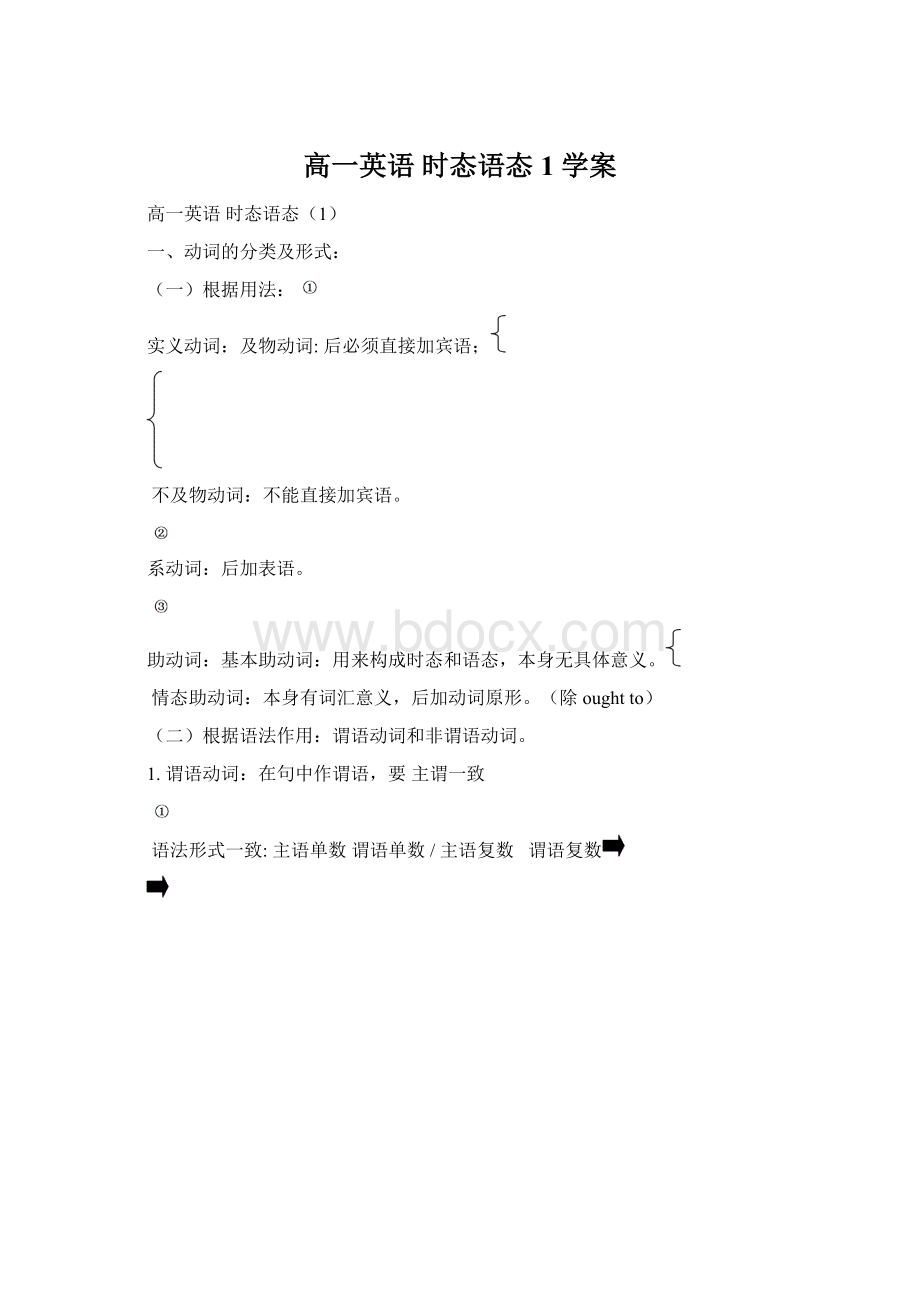高一英语 时态语态 1 学案.docx
《高一英语 时态语态 1 学案.docx》由会员分享,可在线阅读,更多相关《高一英语 时态语态 1 学案.docx(19页珍藏版)》请在冰豆网上搜索。

高一英语时态语态1学案
高一英语时态语态
(1)
一、动词的分类及形式:
(一)根据用法:
实义动词:
及物动词:
后必须直接加宾语;
不及物动词:
不能直接加宾语。
系动词:
后加表语。
助动词:
基本助动词:
用来构成时态和语态,本身无具体意义。
情态助动词:
本身有词汇意义,后加动词原形。
(除oughtto)
(二)根据语法作用:
谓语动词和非谓语动词。
1.谓语动词:
在句中作谓语,要主谓一致
语法形式一致:
主语单数谓语单数/主语复数谓语复数
Thenumberofthemistakeswassurprising.
意义一致:
主语形式单数、意义复数谓语复数
主语形式复数、意义单数谓语单数
Thecrowdaretalkingaboutthenews./TheUnitedNationswasformedin1945.
主谓一致
就近一致:
谓语动词的单复数与最靠近他的主语保持一致
AorB或EitherAorB
NeitherAorB
NotonlyAbutalsoB
a)
+谓语动词(与B一致)
疑问句中,与靠近它的A一致
b)therebe句型中,出现两个及两个以上的主语时,与靠近他的主语一致
ØTherebe+said/believed/meant/expected/supposed/reported+tobe+名词.
ØTherebe+certain/sure/(un)likely/bound(注定)+tobe+名词.
Exercise:
amisarewaswere
(1)There________adictionaryandtwobooksonthedesk.
(2)There________reportedtobeoilunderthedesert.
(3)There________saidtobeonly43girlsinthisschool.
(4)There________certaintobesomethingwrongwiththeengine.
(5)There________likelytobeanumberofobstaclestothesuccess.
(6)Theteacher,aswellasthestudents,________veryexcitedyesterday.
(7)Eitheryouoroneofthestudents________toattendthemeeting.
(8)Itogetherwithmysister________goodatEnglish.
在解题时要注意以下几个问题:
1.这个动作与主语的关系,是主动还是被动?
2.这个动作可能发生在什么时间?
题干中可参照的时间信息有哪些?
3.这个动作处于什么状态?
是进行中,还是已结束(完成)?
限制或修饰这个动作的状语信息有哪些?
学习目标:
能够根据语境正确运用动词的时态、语态。
【课前预习】
时态
谓语动词的形式
常见的时间状语搭配
主动
被动
1.一般现在时
is,am,are,do,does
is/am/are+done
everyday,often,usually,always
2.一般过去时
did
was/were+done
yesterday,lastweek,anhourago,theotherday,in1982,justnow
3.一般将来时
willdo
is/am/aregoingtodo
willbe+done
nextFriday,tomorrow,intwoweeks
4.现在进行时
is/am/are+doing
is/am/are+being+done
now
5.过去进行时
was/were+doing
was/were+being+done
at8o’clockyesterday,from9to10lastevening,bedoing…when,thistimeyesterday
6.将来进行时
willbe+doing
/
thistimetomorrow
一.动词时态的结构和基本用法
(一)一般现在时thepresentsimple
结构:
主语+动词原形(三单)
常用时间状语:
often,usually,seldom,always,everyday,sometimes,nowandthen,onceaweek
【完成例句】
(1)Myparents___________(live)inavillageneartheSwissbordernow.
Heusually___________(spend)summerinthemountains.
我们一直互相关心、互相帮助。
Wealways_______________________________________________________.
Astemperaturesfallwiththeapproachofwinter,thesoilfreezes.
_________________________________________________________
【结论1】__________________________________________________________
(2)Pride________(go)beforeafall.
Allworkandnoplay________(make)Jackadullboy.
EnglandandFrance___________(separate)bytheEnglishChannel.
太阳从东边升起,西边落下。
_____________________________________________________
【结论2】__________________________________________________________
注意:
此用法如果出现在宾语从句中,即使主句是一般过去时,从句谓语也要用一般现在时。
地理老师告诉我们地球绕着太阳转。
Thegeographyteachertoldusthat_______________________________________.
(3)Thejob________(call)forgreatpatience.
Thepen_________(write)smoothly.
AuntWang________(write)goodEnglishbutdoesnotspeakwell.
Allthestudentshere________(belong)toNo.1MiddleSchool.
【结论3】______________________________________________________________
(4)PEACETALKSFALL.
Owenshoots,buttheballshitsthepost.
Thestoryissetinthespringof2003.
【结论4】________________________________________________________________
(5)Nowwatchme,Iswitchonthecurrentandstandback.
【结论5】________________________________________________________________
(6)_________________________
1WhenI_______(graduate),I’llgotothecountryside.
2Shewon’tgotobeduntilhe_________(finish)hishomework.
3Ifyou_______(come)thisafternoon,we’llhaveameeting.
4Therewillbeapicnicunlessit________(rain)tomorrow.
5Makesurethatallthewindows_______(close)beforeyouleave.
6Besureyou_______(finish)ittoday.
7Seetoitthatthedoor_________(lock)beforeyougotobed.
8Thetrain________(leave)atnineinthemorning.
9Theshop________(start)at10:
00a.m.and________(close)at8:
00p.m..
【结论6】_______________________________________________________
__________________________________________________________________________
【结论7】
“确保(做)……,务必(做)……”
Makesure;Besure;
+(that)+从句(常用一般现在时表将来)
Makecertain;Takesure
See(toit)+that+从句(常用一般现在时表将来)
【结论8】_______________________________________________________
__________________________________________________________________________
表示往返位移的动词:
arrive,come,drive,fly,go,leave,
move,return,ride,sail
表示开始结束的动词:
begin,close,end,open,start,stop
(7)_________________________
1He________(say)hecan’twaitanymore.
2Myfriends_________(tell)methatyou’vebeenunwell.
3I_______(hear)youwantasecretary.
【结论9】____________________________________________________________________
(8)_________________________
It_______(be)tenyearssinceImovedtoShanghai.
【结论10】_____________________________________________________________________
(9)【结论11】用于倒装句中,表示动作正在进行。
Herecomesthebus.=Thebusiscoming.
(二)一般过去时thepastsimple
结构:
主语+动词过去式
常用时间状语:
yesterday,lastnight,twodaysago,in2000,atthattime,beforeliberation,when等引导的含过去时的句子
(1)基本用法:
1HesawMr.Wangyesterday.
2Heworkedinafactoryin1986.
3RomanEmpireexistedforcenturies.
4WelivedjustoutsideOxfordinthenineties,butwedidn’thaveacar.
5Herodeahorsetoschooleverydaywhenhewasachild.
6EverymorningItookawalkwhenIwasinthecountryside.
7Mybrotherappliedforavisasixtimesbeforehegotone.
【结论1】___________________________________________________________
__________________________________________________________________________
【结论2】___________________________________________________________
___________________________________________________________________________
【结论3】___________________________________________________________
___________________________________________________________________________
注意:
句中没有表过去的时间状语,但句子仍应该用一般过去时的情况。
a)从上下文语境中可以知道句子的含义指过去;
b)和一般现在时形成对比时,对比部分用过去时;若主句用过去时,对比部分用过去完成时;
c)在since从句中,用过去时;
d)前面有现在完成时引导时,句子用过去时;
(2)一般过去时的特殊用法
✧用于对已去世的人的情况描述;
✧过去时和ever、never、once连用,表示过去的经验;
✧代替过去完成时,说话人不强调先后,不强调因果关系;
Exercise:
1It______(be)overtwoyearssinceI_______(enter)thisschool.
2He______(be)nolongerthemanhe______(be)fiveyearsago.
3Hehashurthisleg,sohe_________(notwin)thegame.
4-----Yourbrotheriscomingtoseeyou.
-----Really?
I_________(notknow)he________(come).
5Shenever_________(hear)suchabeautifulsongbefore.
6Whentheclock________(strike)ten,weallwenttobed.
(三)一般将来时thefuturesimple
定义:
表示将要发生的动作或存在的状态及打算、计划或准备做某事。
基本结构:
主语+will/shall+do
时间状语:
tomorrow,nextday(week,month,year…),soon,inafewminutes,by…,thedayaftertomorrow,etc.
1.will/won’t表示“预测(prediction)”的将来,即根据分析判断。
认为某事肯定会发生,或某人肯定做某事;
2.will/won’t表示“意愿和决心(decisionsandintentions)”的将来,指个人的意愿,所作的承诺,或强调所下的决心;
3.will/won’t表示“必然趋势或结果”的将来,与安排或意愿无关,常见于if条件句连用,表示如果一件事情的发生,另一件事情就必然会发生。
其他可用于表达将来的结构及其含义
(1)begoingto+V原(主观的打算或计划)
a)根据目前状况推断某事即将发生,“将要,就要…….”
b)事先考虑好做某事,“打算…….”
注意:
1begoingto可用于条件状语从句中表将来,will则不能
Ifyou’regoingto(不用will)attendthepartythisevening,you’dbettergetyourshoescleaned.
2when或if引导的状语从句描述随着一件事情的发生,另一件事就将发生时,主句不能用begoingto
Whenhecomes,Ishall/will(不用amgoingto)givehimyourmessage.
Ifyoucomeoutforawalk,youwill(不用aregoingto)feelmuchbetter.
(2)beto+V原(客观安排或受人指示而做事)
●按计划、安排即将做的事,“将要,就要,即将…….”;
●表示“正式的安排”,意为“预定”,常见于报纸和广播,用于宣布官方计划或决定;
●表示“意志”“命令”或“可能性(指某事日后难以避免或注定要发生)”
●用于表示愿望的if从句中,意为“只有主句的行为发生之后,if从句中的愿望才能实现”。
IfBritishtennisistoreachworldstandardagain,bothmoremoneyandmorecommitmentwillbenecessary.
(3)beaboutto+V原意为“正要,即将……”
表示眼下就要发生的事,因此后面一般不加表将来的时间状语。
Ø…beabouttodo…when…,意为“正要…突然…”,多用一般过去时
Ø…bedoing…when…,意为“正在做…突然…”,多用一般过去时
(4)bedueto+V原,“定于(某时做某事)”,常与时间状语连用
Themeetingisduetostarton26thMay.
(5)beonthepointofdoing…“正要做…时.”
belikelytodo…“有可能要…”
besuretodo…“必然会…”
(6)祈使句,and+句子(一般将来时)
祈使句,or+句子(一般将来时)
Exercise1:
1.Hesteppedintotheoffice,_____downandbegantofillintheforms.
A.sittingB.tositC.satD.havingit
2.I’llgowithyouassoonasI____myhomework.
A.willfinishB.finishC.amfinishingD.finished
3.——Comein,Peter,Iwanttoshowyousomething.
——Oh,howniceofyou!
I_____you_____tobringmeagift.
A.neverthink;aregoingB.neverthought;weregoing
C.didn’tthink;weregoingD.had’tthought;weregoing
4.Thevolleyballmatchwillbeputoffifit_______.
A.willrainB.rainsC.rainedD.israining
5.——CanIjointheclub,Dad?
——Youcanwhenyou____abitolder.
A.getB.willgetC.aregettingD.willhavegot
6.——Doyoulikethematerial?
——Yes,it_____verysoft.
A.isfeelingB.feltC.feelsD.isfelt
7.——Yourphonenumberagain?
I____quitecatchit.
——It’s9568442.
A.didn’tB.couldn’tC.don’tD.can’t
8.——DidyoutellJuliaabouttheresult?
——Oh,no,I_______.I_______hernow.
A.forget;willcallB.forgot;amtocallC.forgot;willcallD.forget;willbecalling
9.He’llbeanastronautbythetimehe_____thirty.
A.isB.hadbeenC.willbeD.isgoingtobe
10.Greatchanges______inmyhometownsinceliberation.
A.havebeentakenplaceB.tookplace
C.havetakenplaceD.weretakenplace
11.Itogetherwithmysister________goodatEnglish.
12.Eitheryouoroneofthestudents________(be)toattendthemeeting.
13.Theexaminationwasfareasierthanwe____